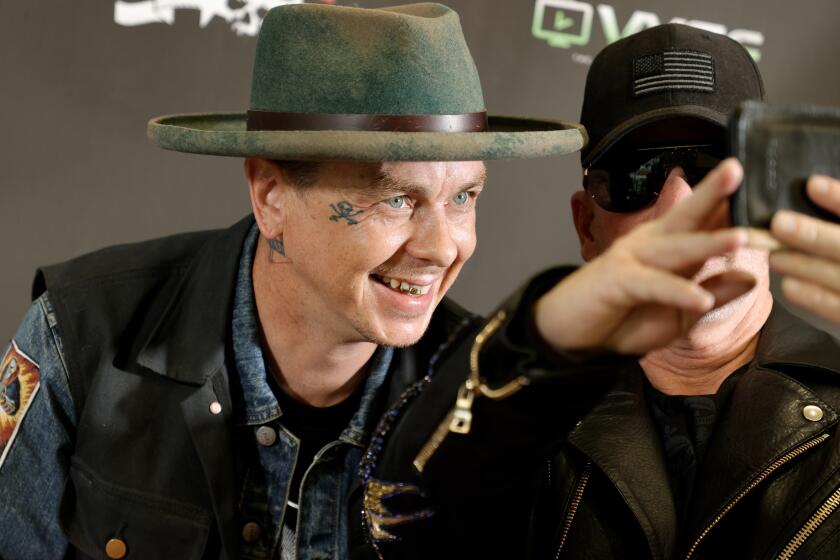A Mixed Bag at Playboy Jazz Festival
The house was sold out a full week in advance. That, of course, tells us nothing about the state of the jazz art; it merely signifies that organizers of the Playboy Jazz Festival know how to do their job, and after nine years at it they have fine-tuned it to the nth degree.
Of the 10 main attractions presented Saturday at the Hollywood Bowl, five were artistically satisfying, two were of moderate interest, three were not. Unsurprisingly, two in the last category were the most riotously received. The crowd went berserk when Jeff Lorber’s saxophonist, Dave Koz, took his horn up into the bleachers (amply amplified, of course). When Lorber’s two soul singers hollered their way through “Back In Love,” you looked at your ticket to check whether you had accidentally arrived at the Motown Funk Festival.
Grover Washington Jr. enjoyed similar success on a more legitimate level, but again histrionics superseded aesthetics when two more vapid singers commandeered the stage. Washington is a key figure in customer-friendly jazz. His saxophonic medium might well be designated as the acoustic excitement synthesizer. Synthetic or not, it stirred the blood of the 18,000 out there, give or take a few malcontents.
Between 3:30 and 6:30 p.m., uninterruptedly splendid jazz was heard: The Count Basie Band, Joe Williams, Stan Getz and Sarah Vaughan did, as flawlessly as ever, what they have done unceasingly for lo these many years.
Despite poor sound balance, the Basie group, led by Frank Foster, got its point across, mostly with old charts such as Ernie Wilkins’ “Good Time Blues” (Lynn Seaton bowing his bass and singing a la Slam Stewart) and one or two new items such as “House on Fire,” a brisk showcase for Danny House, the young alto saxophonist. The band also supplied backing for the Williams and Vaughan vocals.
Stan Getz now has a quartet that may be his best ever. In Kenny Barron he has a vital, driving pianist who is also a gifted composer (his “Voyage” was a highlight). Rufus Reid’s bass came across bold and brilliant, and Victor Lewis on drums offered a solid undercurrent.
Getz’s sound is as calmly appealing as ever; his linear concepts are unceasing wonders of melodic creation. He paid tribute to Victor Feldman’s memory in the Feldman compositions “Seven Steps to Heaven” and “Falling in Love.” Getz will never drive an audience to aisle-dancing hysterics; his appeal is aimed at the mind rather than the feet.
A sextet billed as the Leaders steered an intelligent midway course between hard bop and the avant-garde. The trumpeter Lester Bowie cut a fluent path through his own “Zero.” Chico Freeman, on tenor sax, showed how to make the same note produce six different tones. Arthur Blythe’s alto sax displayed power and passion, but he lapsed into a saccharine-sound on Ellington’s “Sentimental Mood.” Kirk Lightsey’s energetic piano shared the rhythm credits with Cecil McBee’s supple bass and Don Moye’s drums.
The opening act, the Hemet High School Band, was a typically efficient bunch, notable for the presence of a large contingent of girls, including five of the six saxophonists. Next, Duke DeJan’s Olympia Brass Band from New Orleans marched through the aisles, its appeal strictly visual. This is no doubt how the music sounded before there were microphones, perhaps even before telephones.
The long day ended with the rolling tones of drummer Charlie Watts, whose 32-piece band from England, playing bloated arrangements of swing era standards, gave a satisfactory account of itself, with the trumpeter Jimmy Deuchar, the vibraphonists Bill LeSage and Jim Lawless, and a few other capable soloists. But there are many ways in which a dozen saxes, seven trumpets, five trombones and the rest could have been put to more original use. The best way of all might have been simply to break up this musical hippopotamus into two 16-piece bands and let each perform on a separate night.
Bill Henderson emceed, subbing for Bill Cosby, who, delayed in transit, arrived just in time to announce Watts’ closing set.
More to Read
The biggest entertainment stories
Get our big stories about Hollywood, film, television, music, arts, culture and more right in your inbox as soon as they publish.
You may occasionally receive promotional content from the Los Angeles Times.










